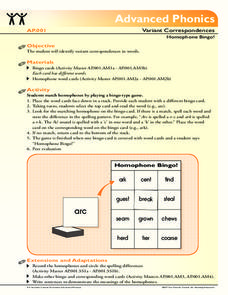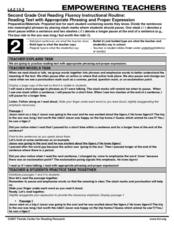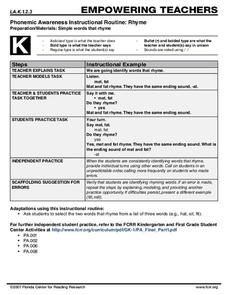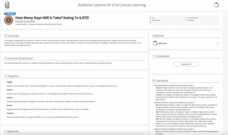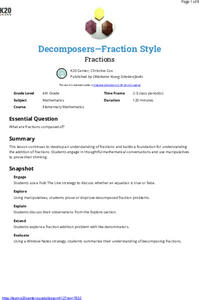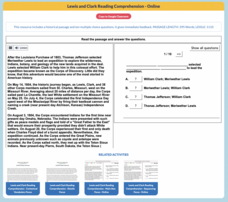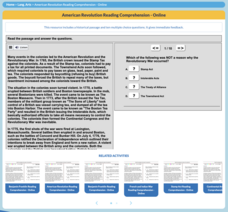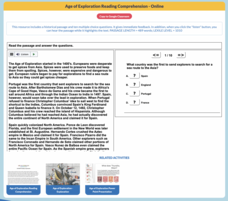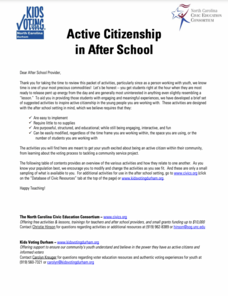Core Knowledge Foundation
Colonial Towns and Townspeople Tell It Again!™ Read-Aloud Anthology
A read-aloud anthology focuses on colonial towns and townspeople. Over three weeks, young scholars listen to stories, participate in discussions about town life, practice word work, and complete an extension activity with each...
Curated OER
How Will We Create a Future without Waste?
Many young people act globally by reducing, reusing, and recycling, Now they take it to the next level by upcycling. Middle schoolers design a proposal to eliminate waste by exploring the new material cycle and applying...
Florida Center for Reading Research
Advanced Phonics: Variant Correspondences, Homophone Bingo!
Phonics doesn't just have to be a daily routine for class members. Spruce up their phonemic awareness with an exciting game of Bingo! Young grammarians select cards, locate their matching homophones, spell the pairs, and identify how...
Curated OER
Oral Reading Fluency: Reading Text with Appropriate Phrasing and Proper Expression
Understanding punctuation is a vital part of reading with appropriate phrasing and proper expression. Second graders take care to emphasize each sentence and phrase they are reading based on punctuation. They read as a class and then on...
Florida Center for Reading Research
Phonemic Awareness Instructional Routine: Rhyme
As a class, kindergarteners identify rhyming words. The teacher provides an example of a rhyming pair and explains why they rhyme. Individual learners then respond by saying a word that rhymes with a given word.
K20 LEARN
How Many Days Will It Take? Eating To 6,972!: Partial Quotients
The story, How Many Jelly Beans? by Andrea Menotti introduces a lesson about partial quotients. Mathematicians practice rounding and multiplying, then work in small groups to connect those skills with division and partial...
K20 LEARN
Building Numbers: Addition And Subtraction Up To 10
Animals on Board! Stuart J. Murphy introduces scholars to composed numbers in preparation for writing and drawing true or false number sentences. A game of Bear in the Cave challenges pupils to locate a missing addend. Sorting...
K20 LEARN
Comparing Numbers And Fruit—More Or Less: Comparing Numbers
A discussion begins a lesson on comparing numbers. Pupils explain how they can show a number, then visit math centers to explore number-making tools. A story read-aloud of More or Less by Stuart Murphy identifies language for...
K20 LEARN
Decomposers—Fraction Style: Fractions
"What are fractions composed of?" is the essential question of a lesson designed to enhance understanding and strengthen the foundation of adding fractions. Mathematicians start by discussing what makes an equation true or false,...
K20 LEARN
Break It Apart: Multiplication Strategies
Reinforce multiplication strategies with a lesson that examines a word problem and the distributive property. Mathematicians work collaboratively to solve the problem, create a poster with their solution, and share their preferred method...
K20 LEARN
Baking Cupcakes!: Fractions
Following an engaging video, mathematicians solve a word problem about baking cupcakes using fractions. Scholars practice different problem-solving strategies, then find different ingredient amounts for their recipes. Pupils solve a...
Mr. Nussbaum
Lewis and Clark
An informational text focuses on Lewis and Clark. Scholars read the text and answer 10 questions to test their reading comprehension skills.
Mr. Nussbaum
American Revolution
An interactive practice challenges scholars to read an informational text and answer 10 questions. The topic of the passage is the American Revolution.
Mr. Nussbaum
Amelia Earhart
Amelia Earhart is the focus of a reading comprehension interactive practice. Scholars read an informational text; then answer 10 questions.
Mr. Nussbaum
Age of Exploration
An informational text focuses on the Age of Exploration. Scholars read the passage and then answer 10 questions to test their reading comprehension skills.
Carolina K-12
Active Citizenship in After School
Active citizenship is the bedrock of any great democracy. Continue the trend by teaching the next generation about voting rights and the functions of elections in society. The variety of activities in the resource includes a human...
Overcoming Obstacles
What Is Overcoming Obstacles?
Just like becoming proficient at playing an instrument or sport requires practice, so too does developing the skills to overcome life's obstacles. That's the big idea in the first lesson in a life skills course. To begin, participants...
Lions Clubs International Foundation
Mindful Self-Awareness Exercise: Accurate Self-Perception
When we look in a mirror, we often don't see ourselves as others see us. Our mirror may be clouded, cracked, or distorted by what we see as our weaknesses. The final exercise in the mindfulness series focuses on building a more accurate...
Lions Clubs International Foundation
Mindful Self-Management Exercise: Self-Motivation
Has your motivation disappeared? The seventh activity in the eight-part mindfulness series has participants remembering a time when they were frustrated by a situation and lacked the motivation to deal with it. They then practice...
Lions Clubs International Foundation
Mindful Self-Awareness Exercise: Recognizing Strengths
Kermit the Frog may lament that it isn't easy being green, but the good news is that his greenness is a strength that helps him hide from predators. A mindful self-awareness exercise helps participants recognize and celebrate their...
Lions Clubs International Foundation
Mindful Self-Management Exercise: Managing Stress
Let it go! As part of the Mindfulness series, pupils learn a technique to manage stress and strong emotions. While doing the deep breathing exercise, they imagine a train of stressful thoughts, take a step back, and let the train pass.
Lions Clubs International Foundation
Mindful Self-Awareness Exercise: Building Self-Confidence
Each of us is unique, with particular traits and strengths. A mindfulness exercise helps participants build self-confidence by asking them to give themselves compliments. Pupils learn how to craft "I" messages that acknowledge what they...
Lions Clubs International Foundation
Mindful Self-Awareness Exercise: Identifying Feelings
A self-awareness activity teaches pupils to identify their feelings by focusing on different parts of their bodies. Participants begin by focusing attention on their feet, then calves, moving up slowly to the top of their head, and...
Lions Clubs International Foundation
Mindful Self-Management Exercise: Responding Using S.T.O.P.
Respond rather than react! A self-management exercise teaches pupils a Mindful S.T.O.P. activity. Participants Stop their thoughts or actions, Take deep breaths, Observe how they are feeling, then Proceed with a response that will help...




